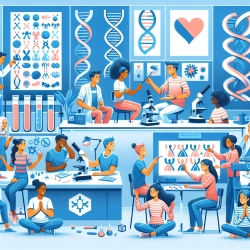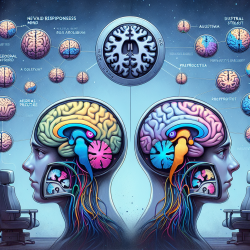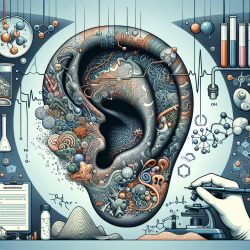Hey there! Today, I want to talk about something super interesting and important—how we can use the latest research in cytogenomics to improve our skills as practitioners and help our students even more effectively. This topic comes from the "Abstracts of the 12th European Cytogenomics Conference 2019," and I think you'll find it both fascinating and practical.
First off, let's get a quick understanding of what cytogenomics is. Essentially, it's the study of chromosomes and their structure, function, and role in diseases. This field is crucial for diagnosing genetic disorders and understanding how our genes affect our health and development.
Why Should We Care About Cytogenomics?
As educators and therapists, our goal is to support our students in every way possible. By understanding cytogenomics, we can gain insights into various genetic conditions that might affect our students' learning and behavior. This knowledge allows us to tailor our approaches to meet their unique needs more effectively.
Key Takeaways from the 12th European Cytogenomics Conference
The conference covered a wide range of topics, but here are a few key points that stood out:
- Advances in Diagnostic Techniques: New methods like whole-genome sequencing (WGS) and digital PCR are making it easier to identify genetic abnormalities. These techniques are not only more accurate but also faster, which means quicker diagnoses and interventions.
- Importance of Early Detection: Detecting genetic conditions early can significantly improve outcomes. For example, identifying chromosomal abnormalities in prenatal stages allows for early interventions that can make a huge difference in a child's development.
- Role of Chromosomal Mosaicism: Understanding how chromosomal mosaicism (where some cells have different genetic makeup) affects individuals can help us create more personalized educational plans. This is particularly relevant for conditions like Down syndrome and Turner syndrome.
How Can We Implement This Knowledge?
Now, let's talk about how we can apply these insights in our educational settings:
- Stay Updated: Keep yourself informed about the latest advancements in cytogenomics. Attend conferences, read research papers, and participate in workshops.
- Collaborate with Geneticists: Work closely with geneticists and other healthcare professionals to understand the specific needs of your students. This collaboration can help you develop more effective educational strategies.
- Promote Early Screening: Encourage parents to consider genetic screening for their children, especially if there are signs of developmental delays or other concerns. Early detection can lead to early intervention, which is often more effective.
- Personalize Learning Plans: Use the information from genetic screenings to create individualized learning plans. Understanding a student's genetic makeup can help you tailor your teaching methods to their specific needs.
Encouraging Further Research
While we have made significant strides in cytogenomics, there's always more to learn. Encourage your students and colleagues to engage in research. Whether it's a small classroom project or a larger study, every bit of research contributes to our collective understanding.
To read the original research paper, please follow this link: Abstracts of the 12th European Cytogenomics Conference 2019.
Conclusion
Implementing the latest research in cytogenomics can significantly enhance our ability to support our students. By staying informed, collaborating with experts, promoting early screening, and personalizing learning plans, we can make a meaningful difference in their lives. Let's continue to learn and grow together!
If you have any thoughts or questions, feel free to share them in the comments below. Let's keep the conversation going!










